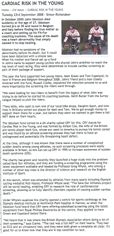In October 2005 John Ibbotson died suddenly at the age of 27. Ibbotson turned pro at 20 and raced in Belgium and Italy before finding his true metier as a coach and setting up his Fit-for coaching business. The cause of his death was a heart abnormality that simply caused it to stop beating.
Ibbotson had no symptoms of the abnormality before his death, but it could have been detected with a simple test. When his mother and fiancé set up a fund in John's name to support young cyclists who shared John's ambition to reach the top level of road racing, they were determined to include cardiac screening as part of their package of support.
This year the fund supported two young riders, Matt Green and Tom Copeland, to race in France and Belgium throughout 2008. John's friend and a man closely involved with the fund, Rusell Clarke, explained the selection process to us and more importantly the screening the riders went through.
"We were looking for two riders to benefit from the legacy of what John was trying to do before he started his coaching business. Keith Butler from the Surrey League helped us pick the riders.
"Tony Mills, who used to own one of our local bike shops, Dauphin Sports and now lives in Brittany, sorted out places for Matt and Tom. We've got enough money to support them for a year, but before they went we wanted to get them a full MOT done on their hearts.
The Ibbotson fund turned to a UK charity called CRY for this. CRY stands for Cardiac Risk in the Young, and was formed by Alison Cox, the wife of the British pro tennis player Mark Cox, whose son went to America to pursue his tennis career and was found by an athlete screening process they had there to have an undiagnosed and potentially life threatening heart defect.
At the time, although it was known that there were a number of unexplained sudden deaths among young athletes, no such screening processes were easily available in Britain, so Mrs Cox set up CRY in 1995 to increase awareness of Sudden Death Syndrome (SDS).
The charity has grown and recently they launched a huge study into the problem called Save Our Athletes, and they are funding a screening programme using the latest equipment available and headed by Professor Greg Whyte, who among a number of other key roles is the director of science and research at the English Institute of Sport.
At the launch, which was attended by athletes from many sports including Olympic medallist Rob Hayles, Professor Whyte said: "The Save Our Athletes project will be world leading, enabling CRY to research the role of cardiovascular screening, allowing us to fully identify disorders capable of causing sudden cardiac death."
Under Whyte's auspices the charity opened a centre for sports cardiology at the Olympic Medical Institute at Northwick Park hospital in Harrow, so when the Ibbotson fund heard that CRY were offering subsidised screening using the latest equipment from Royal Phillips Electronics at the centre, they applied to have Green and Copeland tested there.
"We heard that it was where the British Olympic Association were doing a lot of their screening," says Clarke. "The test was a full MOT on their hearts. They had an ECG and an ultrasound test, and they were both given a complete all clear. It's good for us know now they are in top condition to race.
"Since John's death I've become really aware of heart problems in athletes and how they might have been undiagnosed in the past. Just in my own area we've had Sean Yates with his problem that has only recently come to light, and another top rider, Russell Fenton raced for years at a high level and has only recently found out that he had a problem.
"Then when you think about it there have always been stories of riders just dropping dead. With the doping problems we know we've had in cycling it's often been put down to drugs, but it has made me think know that the problem is much more common."
Yates, who as Clarke points out, only really had symptoms of his problem emerge after his pro career was over says, "Testing is just common sense, the two of them will probably get more when they get to their clubs in France."
The Ibbotson fund have pledged to support CRY in their current campaign to introduce routine screening for teenagers in secondary schools, as well as testing of Olympic level athletes, and their subsidised screening programme at Harrow, Colchester and in Northern Ireland. On top of this CRY also have a mobile unit that visits sports clubs, schools and local communities.
It makes sense at any time of life to have a complete physical check up if you are involved in sport. Some national cycling bodies make it a condition of their issuing a racing licence, although British Cycling doesn't at the moment. But CRY hope one day to make the screening of young sports people a routine precaution that everyone goes through.






